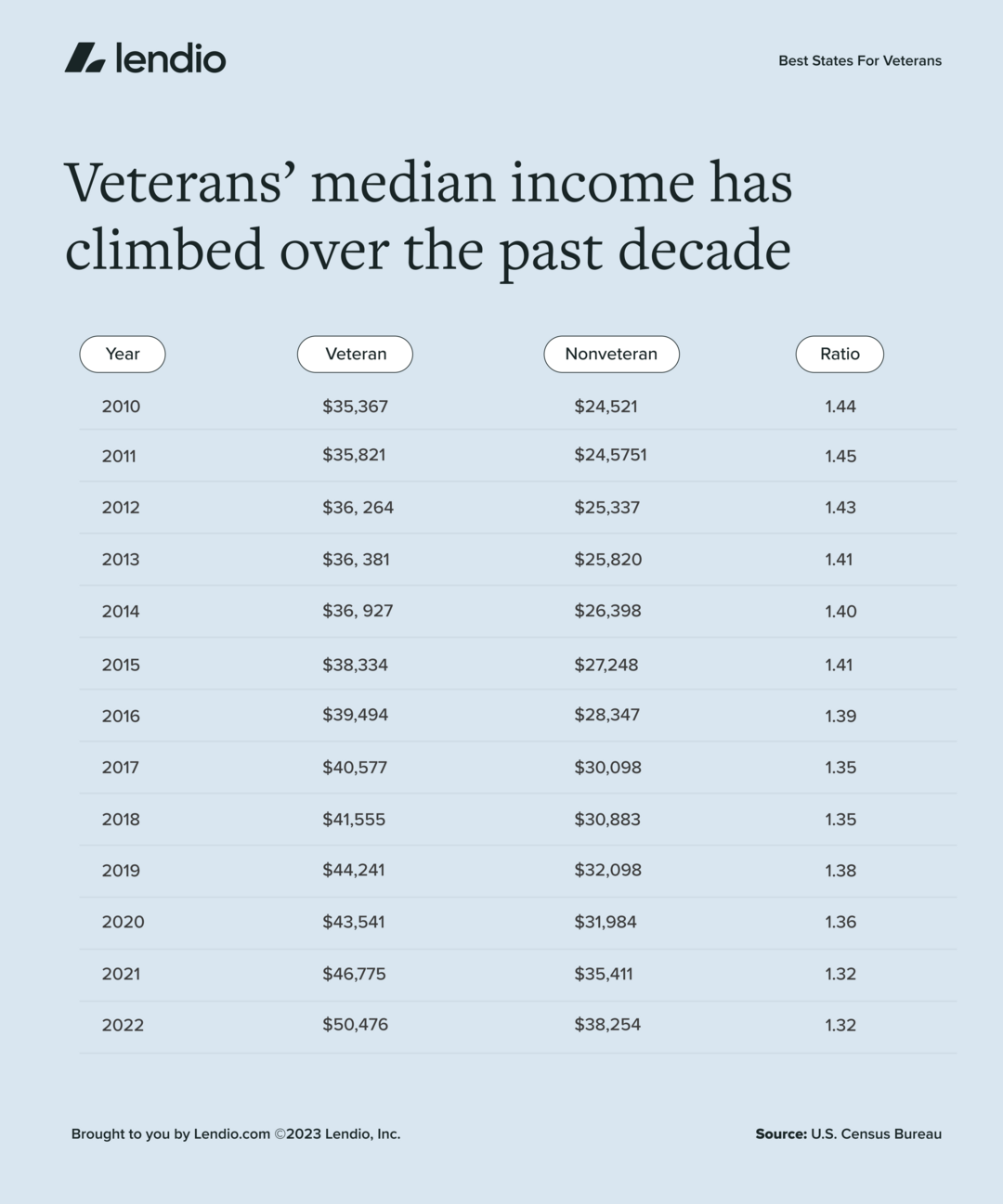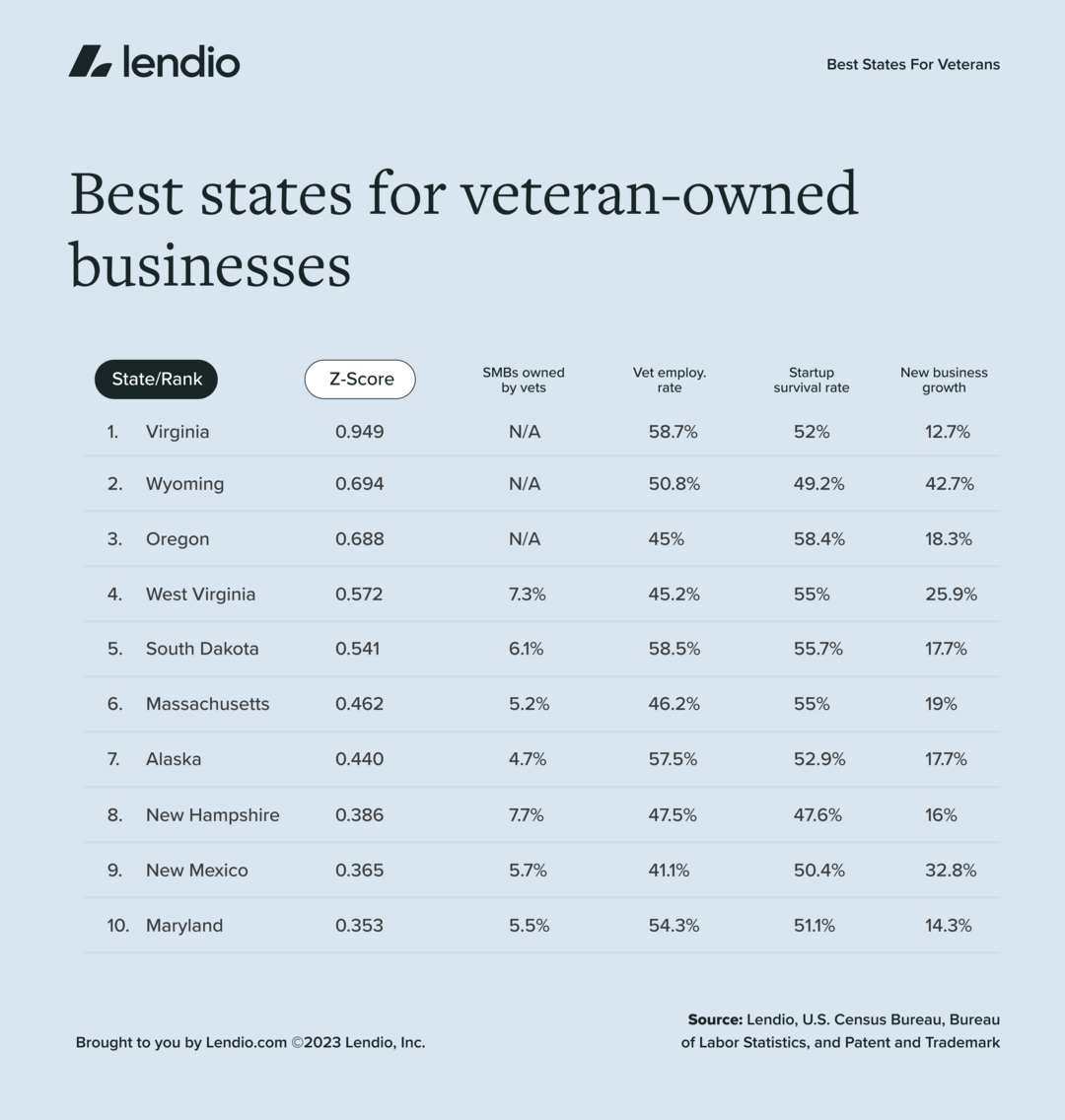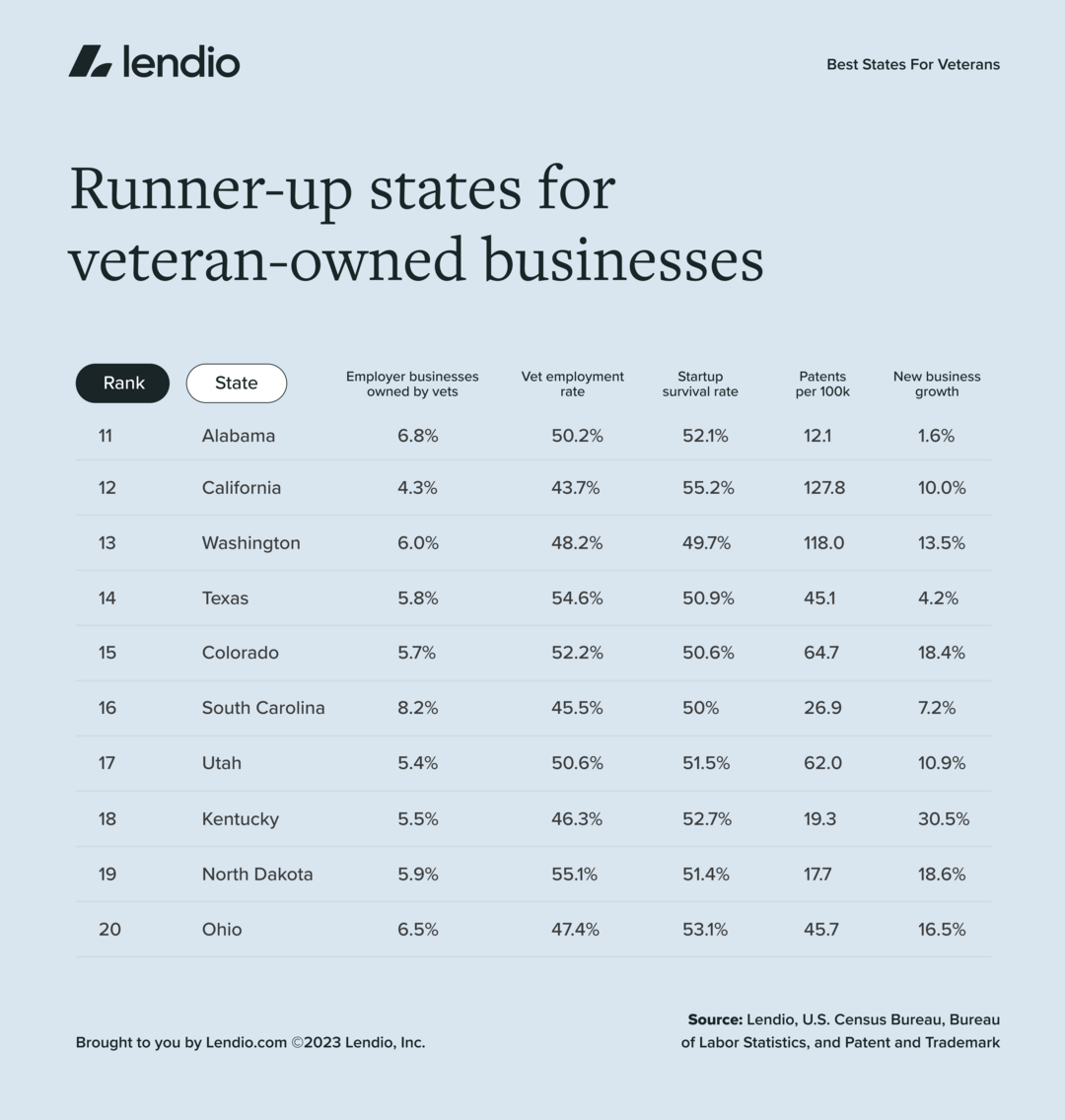These states offer the greatest benefits to veteran-owned businesses

Photo illustration by Stacker / Canva
These states offer the greatest benefits to veteran-owned businesses
A photo illustration of military personnel climbing atop a tank with an American flag in the foreground
When America’s military members enter civilian life, veterans tend to out-earn their nonveteran peers—indeed, the median income for veterans reached a record-high of $50,476 in 2022, compared with $38,254 among nonveterans.
There’s no shortage of notable veteran business owners, such as Nike co-founder Phil Knight who served in the U.S. Army and is currently worth an estimated $39 billion; FedEx founder Frederick Smith, a Vietnam-era Marine worth nearly $6 billion; and Bob Parsons, also a Vietnam Marine vet, who founded GoDaddy and has a net worth of $3.6 billion to show for it. Warren Buffett, one of America’s wealthiest people, has even said that his time in the Nebraska National Guard taught him how to take orders, learn from others, and have fun doing it.
And while the number of veteran-owned businesses has been falling over time, research indicates that veterans are more likely to be self-employed than nonveterans and that veterans with small businesses have higher average net worths than non-entrepreneurial veterans.
Veterans have unique skill sets and discipline that may prime them perfectly to lead. In surveys, veterans tend to say that their military service helped prepare them to run a small business. But even so, they’re more likely than nonveterans to be concerned about business regulations, lack of connections, financing, and getting customers—which could point to a lack of support for veteran entrepreneurs in parts of the country.
Lendio analyzed six metrics to determine the best states for veterans to succeed in business, including veterans’ income, employment, and business ownership, as well as startup survival, patent innovation, and new business growth. Those metrics were split into two subcategories: veteran labor market and entrepreneurship.
The results indicate that the best states for veteran entrepreneurs are scattered across the country, with no one region dominating the list. Support for veterans can be found everywhere—but some states offer softer landing pads for veterans as they decide where to set up shop or expand their businesses.
![]()

Lendio
Here are some key findings
A graphic of veterans median income over the past decade
- Virginia is the No. 1 best state. Driven by strong earnings and employment. Virginia veterans’ median income was $68,124 in 2022, compared with $41,429 among nonveterans.
- Top states span across the U.S. Wyoming, Oregon, West Virginia, and South Dakota rounded out the top five states. They typically had high rates of veteran business ownership (for example, 7.3% in West Virginia) and veteran employment (58.5% in South Dakota).
- States with the strongest veteran labor market aren’t always the most entrepreneurial. Some states scored well for one subcategory, but not the other—such as No. 11 Alabama, which ranked second for veteran labor market, but 47th for entrepreneurship. That means states that came out on top in the overall ranking struck a good balance between being good for veteran workers and for those starting a business.

Lendio
The top 10 states for vet-owned businesses
A graphic of best states for veteran owned businesses
No. 1: Virginia
Virginia is a great state for veterans in the labor market, given that 58.7% of veterans there are employed and their average earnings are 1.6 times higher than nonveterans—better rates than anywhere else in the U.S.
No. 2: Wyoming
Wyoming scores well for both subcategories (8th for the veteran labor market and 6th for entrepreneurship), helping drive it up to the No. 2 spot overall. The state saw a 42.7% increase in new business applications year over year, the highest rate in the country, plus the median income for veterans is 1.4 times higher than that of nonveterans.
No. 3: Oregon
Oregon lands in the middle of the pack for the veteran labor market, but its strong environment for entrepreneurs helped propel it to the No. 3 ranking. The state reports 96.4 patents per 100,000 population, while 58.4% of startups survive at least five years, the highest rate in the U.S.
No. 4: West Virginia
In West Virginia, 7.3% of businesses are owned by veterans, whose median earnings are 1.4 times as high as those of nonveterans. Further, its startup survival rate is 55%, and it saw 25.9% yearly growth in new businesses.
No. 5: South Dakota
In 2022, 58.5% of South Dakota’s veterans were employed, while 6.1% of businesses are veteran-owned. Meanwhile, 55.7% of startups survive at least five years, the second-highest rate after Oregon.
No. 6: Massachusetts
Massachusetts has a high rate of patents (125.6 per 100,000) and a high startup survival rate (55%), driving it to the best state in the entrepreneurship subcategory. Its veteran workers perform fairly well, with 5.2% of businesses owned by veterans and 46.2% of veterans being employed.
No. 7: Alaska
Alaska’s veterans earn 1.5 times as much as nonveterans, based on median income in 2022. It also has one of the highest employment rates for veterans, at 57.5%.
No. 8: New Hampshire
New Hampshire has one of the highest rates of veteran-owned businesses, at 7.7%, and it saw 80 patents filed per 100,000 population in 2020.
No. 9: New Mexico
Veterans in New Mexico out-earn nonveterans by a ratio of 1.6—the third-highest ratio in the U.S. after Virginia and Alabama. The state also saw 32.8% year-over-year growth in new business applications, behind only Wyoming.
No. 10: Maryland
Maryland was propelled to the top 10 by its high level of veteran employment (54.3%) and strong income ratio, given veterans’ median income is 1.4 times higher than nonveterans’.

Lendio
Runners-up
A graphic of runner-up best states for vet owned business
The runner-up states tend to excel for either their veteran labor markets or for their entrepreneurship more broadly. For example, 6.8% of businesses in Alabama are owned by veterans, whose median income is 1.6 times higher than nonveterans—a higher rate than almost anywhere else. Texas and South Carolina also scored especially well for their veteran labor markets, driven by their high income ratios (each 1.5).
Meanwhile, states like California, Washington, and Kentucky scored well due to the force of their entrepreneurial communities, with California reporting more patents per 100,000 population than any other state (127.8) and Kentucky seeing 30.5% year-over-year new business growth. Washington also has a high patent rate at 118 per 100,000.
5 tips for veterans to start a business
Veterans have valuable skills and experiences to translate to the private sector. But while it can be highly rewarding to run your own business, getting your firm started is a major endeavor that takes time, planning, and effort. These tips will help you get going:
- Develop a strong business plan – Begin with a well-researched business idea, emphasizing your unique value in the niche or industry you’ve selected. Consider your financial projections, marketing tools, and operations plan.
- Research grants and loan opportunities – The Small Business Administration offers programs, grants, and loans designed to support veteran entrepreneurs, such as the Boots to Business initiative. Some organizations and nonprofits also offer financial support and coaching.
- Network – Connect with other entrepreneurs, veterans, and mentors who can offer guidance and support. Get involved with the local business community and join industry-specific groups to spread the word about your business.
- Establish solid legal and financial structures – Choose wisely whether it makes the most sense to establish an LLC, sole proprietorship, or corporation. Make sure to also separate your personal and professional finances and ensure you’re compliant with federal and local regulations.
- Be patient – It takes time to establish a successful business. With the right tools in place, you’ll be able to stay resilient as you get your business up and running.
The success of veterans as entrepreneurs underscores their impressive contributions to the American economy. Our findings emphasize the need for continued efforts to empower veteran entrepreneurs, allowing them to harness their full potential to lead and excel in the business world.
Methodology
Lendio used the most recent federal data for six metrics across two categories to determine the best states for veterans to start a business. Using a Z-score distribution to scale each metric relative to the mean across all 50 states and Washington D.C., and capping outliers at 3, a state’s overall ranking was calculated using its average Z-score across the six metrics, while its subcategory ranking was calculated using its average Z-score across the three relevant metrics. Three states were missing data for veteran business ownership (Virginia, Wyoming, and Oregon) so their scores were calculated across the remaining five metrics. Here’s a closer look at the metrics used:
- Veteran labor market
- Share of employer businesses owned by veterans, 2020 (Census Bureau)
- Median income ratio, veterans to nonveterans, 2022 (Census Bureau)
- Employment rate among veterans, 2022 (Bureau of Labor Statistics)
- Entrepreneurship
- Five-year startup survival rate, March 2022 (Bureau of Labor Statistics)
- Patents per 100,000 population, 2020 (U.S. Patent and Trademark Office)
- Growth in new business applications, Aug. 2022-2023 (Census Bureau)
This story was produced by Lendio and reviewed and distributed by Stacker Media.





